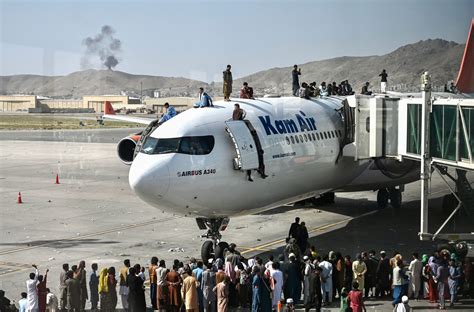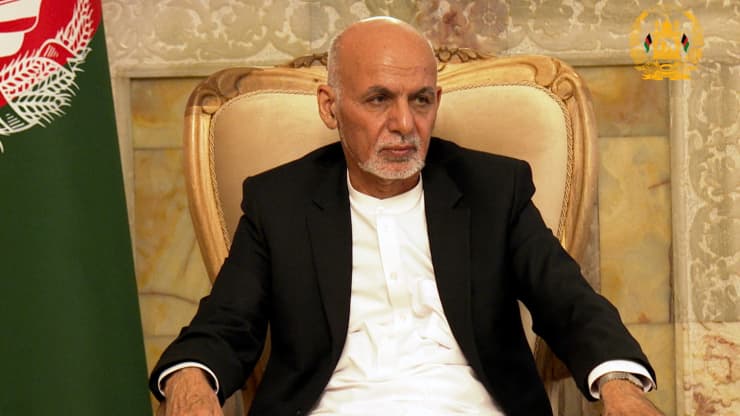
Afghans in panic yesterday, August 15, as the rebel Taliban entered Kabul, climb onto the outside of transport planes about the leave the country. (link)

A shocking video has gone viral in which desperate Afghans, some crowding onto a transport plane (left), some evidently clinging to the underbelly of the C-17 Globemaster, fell from the plane after take-off from several hundred feet, to their deaths. Many Afghans were terrified there would soon be a purge of all Afghans in the country who collaborated with the Americans over the past 20 years, though the Taliban rebels have said their rule will not involve bloody reprisals (link)

This rainbow flag, signaling American support for the LBGT community worldwide, was posted on Twitter by American Embassy in Kabul during the month of June, though many in Afghanistan found it offensive. The embassy tweeted: “The month of June is recognized as (LGBTI) Pride Month. The United States respects the dignity & equality of LGBTI people & celebrates their contributions to the society. We remain committed to supporting civil rights of minorities, including LGBTI persons.” Because Islam considers homosexual acts to be sinful, there was pushback against this type of support for the LBGT agenda in a number of Islamic countries. One government official in the United Arab Emirates (UAE) told CNBC: “The flag-flying. Why rub it in our faces? Why choose us to do this to?”(see this article)

Members of the Taliban leadership give an interview to Al Jazeera after taking control of the presidential palace in Kabul, Afghanistan, August 15, 2021 (Al Jazeera/YouTube)

Afghanistan’s elected President Ashraf Ghani, who fled into exile via helicopter, reportedly for Tajikistan, on August 15 (yesterday), Feast of the Assumption of the Blessed Virgin Mary. (But this report says Ghani is now in Oman, and likely soon will be in the United States.) In the photo, Ghani is attending a security meeting in Kabul, Afghanistan, on August 14, 2021, two days ago. The country fell yesterday to the Taliban. The 14th president of Afghanistan, Ghani was first elected on September 20, 2014 and was re-elected in the September 28, 2019, presidential election. The Taliban ruled Afghanistan from 1996 to 2001, but after the September 11, 2001 attacks on the United States (9/11), the regime of the militant group came to an end as they were removed from power by US-led forces in 2001. Now they have returned (Afghan Presidential Palace | Reuters)
“This is not Saigon.” —U.S. Secretary of State Antony Blinken, speaking to CNN on Sunday morning, August 15 (yesterday), trying to push back against any comparison between America’s withdrawal from Afghanistan and the chaotic withdrawal that came at the end of the Vietnam War in Saigon in 1975 (link)
“After nearly two decades of war, more than 6,000 American lives lost, over 100,000 Afghans killed and more than $2 trillion spent by the U.S., the speed of the Taliban takeover of Afghanistan has shocked the world. U.S. defense officials reportedly expected Afghanistan’s capital, Kabul, to fall in 90 days. It took less than 10 days. Among the key causes, analysts say, are intelligence failures, a more powerful Taliban, corruption, money, cultural differences and willpower.” —CNBC, Monday, August 16, 2021, earlier today
“You failed the younger generation of Afghanistan. A generation … raised in the modern Afghanistan were hoping to build the country with their own hands. They put blood, efforts and sweat into whatever we had right now.” —Aisha Khurram, 22, speaking to American journalists as she watched the evacuation yesterday of the U.S. Embassy to Afghanistan (link)
“’The Taliban regime is coming to an end,’ announced President George W. Bush at the National Museum of Women in the Arts on December 12, 2001 — almost twenty years ago today. Five months later, Bush vowed: ‘In the United States of America, the terrorists have chosen a foe unlike they have faced before… We will stay until the mission is done.’” —British journalist Glenn Greenwald, in an article entitled “The U.S. Government Lied For Two Decades About Afghanistan,” published today here
“The C.I.A., meanwhile, continued dropping off bags of cash — ranging each time from a few hundred thousand dollars to more than $1 million — at the presidential palace every month until last year, when Mr. Karzai [the president before President Ghani] stepped down. The money was used to buy the loyalty of warlords, legislators and other prominent — and potentially troublesome — Afghans, helping the palace finance a vast patronage network that secured Mr. Karzai’s power base.” —from a March 14, 2015 New York Times story entitled “CIA Cash Ended Up in Coffers of Al Qaeda,” which gives insight into the way the American collaboration with the Afghan leadership was conducted for two decades
“Ashraf Ghani… ensured his well-being as, while fleeing, he took along four cars brimming with money. Reports further add that besides that, he took a bag crammed with money in the helicopter. ‘Not all cash managed to squeeze in, and some of the money was left lying on the airfield,’ the report further added.” —Report today at Republicworld.com (link), and also here. The original report on these alleged “bags of money” came from this story in TASS, a Russian news agency, sourced from an un-named Russian embassy staffer in Kabul. Later, the story was sourced by the Russian agency NIA, to a Russian embassy official named Nikita Ishchenko, and Reuters spoke (here) to Ishchenko, who confirmed that he had said the words attributed to him, adding that he had learned of the bags of money from “witnesses.” Reuters “could not independently confirm the veracity of his account,” Reuters reported. This tweet alleges that Ghani “was forced to abandon 5 million dollars, stuffed in bags, at the airport.” So this story of the flight with bags of cash has been widely reported, but it has not yet been reliably confirmed
“That’s it, it’s over.” —a U.S. diplomat speaking to reporters yesterday, August 15, 2021, upon learning that the president of Afghanistan, Ashraf Ghani, had fled the country. The words referred to the 20-year military effort of America to re-shape traditional Afghan Muslim society into a modern, secular state. The words may also perhaps be taken as a sort of epitaph for the “American Century,” which turned out to be… just 76 years
“To the degree that she glorified herself and lived sensuously, to the same degree give her torment and mourning; for she says in her heart, ‘I sit as a queen and I am not a widow, and will never see mourning.’” —Revelation 18:7
“If my people, who are called by my name, will humble themselves and pray and seek my face and turn from their wicked ways, then I will hear from heaven, and I will forgive their sin and will heal their land.” —2 Chronicles 7:14
Letter #86, 2021, Monday, August 16: “That’s it, it’s over”
End of an empire
By Robert Moynihan
Thus ends an epoch of history.
The American retreat from Afghanistan, culminating chaotically and shamefully on August 15, 2021, marks the end of a period of world history we might call “The American Age” (1945-2021).
Historians will spend years analyzing all the reasons, all the mistakes, all the arrogance and crimes and follies, which led to this denouement.
But the point is simply this, in the words of an un-named American diplomat who commented yesterday to reporters on the flight of Afghanistan’s elected president from Kabul: “That’s it, it’s over.”
The American Age is over.
It ended yesterday in Kabul.
And in such a chaotic and shameful way…
***
Yesterday, Afghanistan’s president Ashraf Ghani — who had spent many years as a professor at Johns Hopkins in the United States — fled from Kabul.
Reports originating from the Russian embassy in Kabul (here and here)— widely published but not confirmed — said that, as President Ghani fled, his staff filled four cars with bags of cash — evidently American dollars — then transferred the bags into a waiting helicopter.
But the helicopter was too small to hold all the cash, reportedly, so some bags were left on the tarmac.(!)
Then the helicopter took off.
“That’s it, it’s over,” said one American diplomat to reporters, when he learned of the president’s flight from Kabul. (link)
[Note: This this story, as explained above, may not be true. In this video, there is only one small bag being carried by one of the president’s men onto an airplane, and not a helicopter.]
***
So ended the American empire, which lasted from May 8, 1945, until yesterday: August 15, 2021 — 76 years, three months and one week.
At the end of the Second World War, with the economies of Europe shattered and Europe’s cities pulverized, America possessed more than 50% of the world’s Gross Global Product.
No country in history has ever enjoyed such comparative wealth in comparison to the rest of the world.
America’s influence was therefore massive, enormous, colossal.
That global influence was partly based also on American virtue: on the ideas that were at the root of the American spirit, ideas of “fair play,” reliable honesty in business dealings (based often only on a handshake), clear thinking and a “can do” attitude in the pursuit of technological excellence.
All of this was also related in a profound way to the Christian idea that man is made “in the image and likeness of God” (imago Dei) and therefore has a very great personal dignity, and a great personal responsibility, to live in this truth of his nature — that men and women are “in the image” of a holy, just, good God.
Yet, over the decades, something changed in the American culture, in the American understanding of duties and responsibilities, of what is dignified and what is not dignified, of what is good, and what is not good.
Our attitude toward human life changes, and our attitude toward human death also changed.
The old America believed the one necessary thing to do in life, before the end, was to “get right with God.”
Consider injustices, follies, sins, and make things right, as much as possible, before going to meet one’s Maker.
To balance a spiritual ledger-book, if possible, before the end.
That belief has diminished, slipped away, become rare.
And yesterday, America abruptly abandoned Afghanistan, a country it had pledged to support faithfully.
And as the Taliban poured into the capital, the American-supported president fled, with bags of cash in tow.
And so it ends.
It ends in bags of cash strewn across the tarmac of a helicopter pad in Kabul, and a president fleeing for his life before a group of Muslim insurgents who defeated the empire’s might in an unequal battle that no one thought they could win — except the Taliban rebels themselves.
From the end of World War II (May 8, 1945, the day Germany surrendered to the Western Allies) until yesterday, August 15, 2021, the day the Americans handed over Kabul, and Afghanistan, to the Taliban (and also the Feast of the Assumption of the Blessed Virgin Mary), the United States of America was the pre-eminent global power.
That age ended yesterday.
It ended in confusion, and betrayal, and treachery, and cowardice, and confusion.
It ended in shame.
As an American, as one who believes we live in a fallen world in which we must all struggle to resist the temptation to selfishness, cruelty, deception, oppression, pride, greed, and every sort of sin, I feel shame for what has become of my country.
Not shame for the ordinary citizens, the ordinary soldiers — they still remain, by and large, good people with good hearts, people of faith, people of honor.
But our elites, the leadership of our society in politics, in the military, in the financial system, in the universities, in the courts, and in the churches, is too often no longer honorable, no longer committed to seek the common good, no longer willing to sacrifice for the sake of the nation and its future.
We were a nation blessed as perhaps no other nation ever in the history of the world, from sea to shining sea.
But we have become a nation whose leaders are not distinguished by their commitment to what is good, and honorable, and difficult, and noble, and just.
For this reason, I weep for my country, and pray for America, that she finally listen to the better angels of her nature, and return to the most simple cause of her greatness, her humility and her respect for the common man, which she has allowed to slip away through many short-sighted and selfish decisions over many decades. —RM
(Below, a reflection on St. Stephen of Hungary, whose feast day this is.)
Note: To support our Friends of Lebanon project, click here. Your help is needed now more than ever before. Even small donations are very helpful. Thank you in advance for your generosity. We realize you have many other concerns and obligations, but Lebanon right now is clearly an important cause.—RM
August 16, 2021, the Feast Day of St. Stephen of Hungary (977-1038)
“O Queen of Heaven, august restorer of a prostrate world, to thy care I commend the Holy Church, my people, and my realm, and my own departing soul.” —The last words of St. Stephen, King of Hungary just after the year 1000 A.D., as he lay dying
St. Stephen of Hungary: Short life History (link)
This brief account (below) of the life of St. Stephen of Hungary contains elements that seem suited to reflection on the events of these days, when the leadership of our own country, and, indeed, even of our Church, often seems to lack the fortitude, goodness and charity that distinguished the great Hungarian saint and king, St. Stephen.
***
St. Stephen was the son of Geysa, fourth Duke of Hungary, who, with his wife, converted to the Catholic faith.
Geysa in a vision saw the first Christian martyr, St. Stephen, who told Geysa that he should have a son who would perfect the work he had begun.
This son was born in 977, and received the name of Stephen.
He was most carefully educated, and succeeded his father at an early age.
He began to root out idolatry, suppressed a rebellion of his pagan subjects, and founded monasteries and churches all over Hungary.
He sent to Pope Sylvester II, begging him to appoint bishops to the 11 sees he had endowed, and to bestow on him, for the greater success of his work, the title of king.
The Pope granted his requests, and sent him a cross to be borne before him, saying that he regarded him as the true apostle of his people.
His devotion was fervent. He placed his realms under the protection of our blessed Lady, and kept the feast of her Assumption with peculiar affection. He gave good laws, and saw to their execution.
Throughout his life, we are told, he had Christ on his lips, Christ in his heart, and Christ in all he did.
His only wars were wars of defense, and he was always successful.
God sent him many and sore trials. One by one his children died, but he bore all with perfect submission to the will of God.
When St. Stephen was about to die, he summoned the bishops and nobles, and gave them charge concerning the choice of a successor.
Then he urged them to nurture and cherish the Catholic Church, which was still as a tender plant in Hungary, to follow justice, humility, and charity, to be obedient to the laws, and to show ever a reverent submission to the Holy See.
Then, raising his eyes towards heaven, he said, “O Queen of Heaven, august restorer of a prostrate world, to thy care I commend the Holy Church, my people, and my realm, and my own departing soul.”
And then, on his favorite feast of the Assumption, in 1038, he died in peace.
***
If America were to reflect on the great gifts she has been given, the wealth and freedom and abundance of our country, and if she were to re-dedicate herself to return to that commitment to virtue and honest work that built the country, then perhaps the country could once again be worthy of the blessing of the Almighty, and be again a beacon of light to the world.
[End, reflection on the Feast of St. Stephen of Hungary]
FRIENDS OF LEBANON
The people of Beirut and all of Lebanon are in need of our assistance.
We have spoken with our friends, the Maronite Monks, about how we can help.
You can make a tax deductible donation here.
These donations are restricted to our “Friends of Lebanon” project. These funds are used to develop a precise and effective way to carry out to 2 goals:
1) Short Term Help: to assist those who need immediate assistance – daily needs like food and water, electricity and other essential household items.
2) Long Term Hope: to support projects which will help those most in need to become stable, to become self reliant, to receive education and to stay in Lebanon.
As a donor, you will have an opportunity to join the conversation on a monthly virtual video calls with those who are on the ground in Lebanon, helping those in need.






Facebook Comments